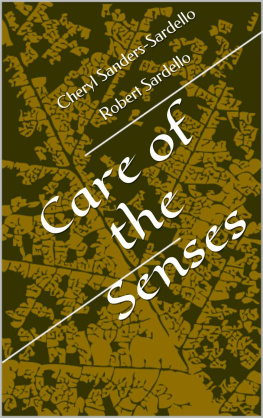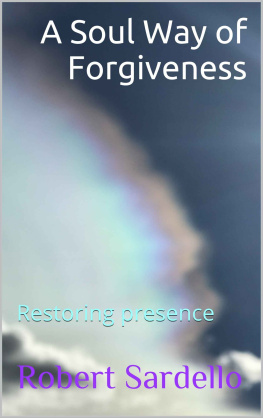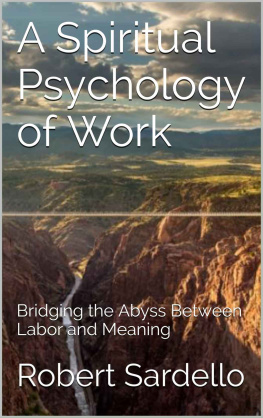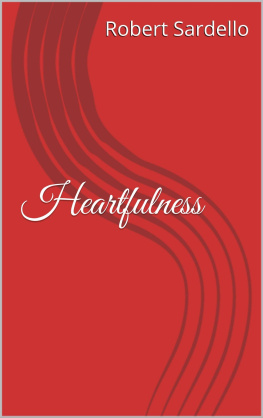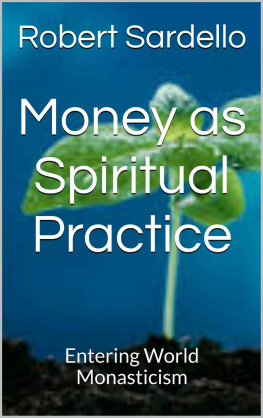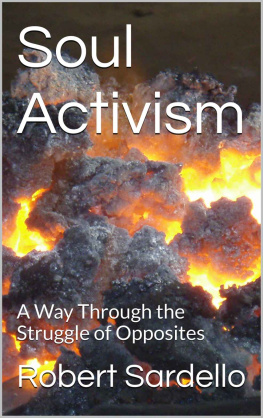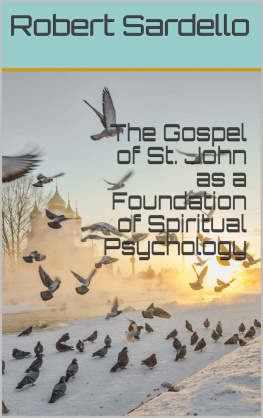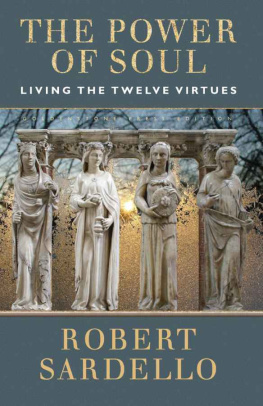Cheryl Sanders-Sardello Robert Sardello - Care of the Senses
Here you can read online Cheryl Sanders-Sardello Robert Sardello - Care of the Senses full text of the book (entire story) in english for free. Download pdf and epub, get meaning, cover and reviews about this ebook. year: 2019, genre: Religion. Description of the work, (preface) as well as reviews are available. Best literature library LitArk.com created for fans of good reading and offers a wide selection of genres:
Romance novel
Science fiction
Adventure
Detective
Science
History
Home and family
Prose
Art
Politics
Computer
Non-fiction
Religion
Business
Children
Humor
Choose a favorite category and find really read worthwhile books. Enjoy immersion in the world of imagination, feel the emotions of the characters or learn something new for yourself, make an fascinating discovery.
- Book:Care of the Senses
- Author:
- Genre:
- Year:2019
- Rating:5 / 5
- Favourites:Add to favourites
- Your mark:
- 100
- 1
- 2
- 3
- 4
- 5
Care of the Senses: summary, description and annotation
We offer to read an annotation, description, summary or preface (depends on what the author of the book "Care of the Senses" wrote himself). If you haven't found the necessary information about the book — write in the comments, we will try to find it.
Care of the Senses — read online for free the complete book (whole text) full work
Below is the text of the book, divided by pages. System saving the place of the last page read, allows you to conveniently read the book "Care of the Senses" online for free, without having to search again every time where you left off. Put a bookmark, and you can go to the page where you finished reading at any time.
Font size:
Interval:
Bookmark:
Care of The Senses
By
Cheryl Sanders-Sardello, Ph.D.,
&
Robert Sardello, Ph.D.
Copyright 2019
www.RobertSardello.com
Table Of Content
What are our senses?
In this writing, you will find a description of not just the five senses we are all familiar with -- touch, smell, taste, vision and hearing, but on top of these, it describes seven more. It describes how we have senses that tell us something about our own body, where it begins and ends, how it feels, how it moves, and how it can be still, so that we can orientate towards the world around us. Then it describes the four senses with which we explore that surrounding world, and how we can find out about the qualities of all we see, taste, smell and feel. The last four senses develop out of transformation of our healthy body senses and become our social senses, they help us to understand what it is someone is trying to tell us, and through that, who this other person is and how we can connect with the people around us, sense who they really are.
The intention Cheryl and I had when writing this view of senses, strongly based d in the Spiritual Science of Rudolf Steiner, however, goes considerably beyond broadening what we know as the senses. Each of the senses is described carefully, experientially, and, as you will notice right away, with a high degree of alarm that the very basis of our bodily being is so rapidly eroding. The erosion of sensing within the wholeness of Earth and Cosmos, the concentration on sensation as sensational rather than the inherent spiritual nature of sensing, practically means that theres no here here. We live now, more and more isolated from ongoing bodily engagement with others. The reason, in large part, is the digitalizing of the world, and as our bodies become more and more like foreign objects, the center of bodily being, the heart, and thus, love, moves further and further into being mind-distance, accompanied by steadily increasing impulses, anxiety and fear. We hope this writing can awaken the countercurrent, the refolding of the human being into the cosmic heartbeat of Love. All of Spiritual Psychology as practiced by our School of Spiritual Psychology has this concern.
In this monograph, we want to recover neglected dimensions of sensing as integral to being fully human. We propose to do this by means of a careful study of the body in its living relationship with the world. Our approach is founded on a synthesis of three streams of modern psychology: existential-phenomenological psychology; C. G. Jung's archetypal psychology of the soul; and psychological contributions found in the spiritual science of Rudolf Steiner, the founder of spiritual science, which he termed Anthroposophy.
Existential-phenomenological psychology contributes an important method of describing the human being as what Maurice Merleau-Ponty a significant philosopher in this tradition-calls the body-subject . By this term, he conveys an understanding of the human body as that mysterious and multifaceted phenomenon that always accompanies one's awareness, and indeed, appears to be the very location of consciousness, both of oneself and the world. Merleau-Ponty 's vivid descriptions of the life of embodiment cut through the legacy of Cartesian dualism, and of approaching the mind as if it were not embodied and behavior as if it occurred apart from consciousness (soul).
Jung's psychology-which he calls a phenomenology of soul life--contributes two important premises to this writing. First, he teaches us to value the inner life and gives a method for doing so objectively by his phenomenology of the soul (or psyche ), which includes more than subjective awareness; furthermore, he does not divide the soul from the body. He sees soul life as a continuum ranging from instinct to archetype. Second, Jung provides a sensibility for the pathological; if we enter his work carefully, we develop a capacity of knowing when soul is dangerously out of balance.
Rudolf Steiner figures centrally in this writing as the individual who for the first time described twelve senses. He presents these descriptions in numerous places but always as brief indications, which we develop much more extensively here. Through his spiritual science, Steiner also gives an understanding of the human being as a being of body, soul, and spirit; and that understanding also guides the present work.
We hope to show how a convergence of three worldviews enable us to lend deep attention to the obvious, and seeking ways of caring for the senses as a work of self-education. We do not propose a new program but instead hope to open the way for research and observation, which must begin with coming to our senses. It is possible to develop the capacity for creative and profoundly new thinking, through an understanding of the human being and the senses through which we come to perceive the world and others.
First, the present conception of the senses is generally limited to the five or seven most commonly known and typically discounted as mere physical functions rather than soul/spirit activities. The nature of the senses lends them to be overlooked and taken merely as the background of perceiving. There are at least twelve senses serving as the basis through which we can enter the world and participate with the unfolding marvels that are its wonders. Sensing plunges us every moment into delights and distractions, horrors and homeliness. To begin to understand the nature of the sea of sensation in which we swim, the senses must be taken out of their usual nexus of interrelation and interdependence and viewed individually in their uniqueness.
Without a capacity to recognize the full range of the sensory world, we have no proper medium to develop thinking in good directions because then the body is always under stress, though we are not directly conscious of that state. We express ourselves through our bodies first. In the world in which we live today, sensory life is culturally disordered, and we seek more avenues for intensifying physical awareness, whether through drugs, food, exercise, television, or any other of the myriad addictions which increase daily.
In any discussion of the senses we must account for how, out of this array of twelve senses, we experience a unified world. While one sense at a time can be paid attention to, in our ordinary, everyday experience, all of the senses work together giving us the world in a unified manner. We take in the world through touch, balance, smell, taste and all the other senses without having to then make a judgment that there is a unified world out there, whole and complete. A physiologist would say that the brain, acting as a computer, puts all the impressions together into a whole experience. However, even if the brain could do this, it would not account for the experience of perceiving the world, because neither computers nor brains experience anything. If we picture the twelve senses arranged around the circumference of a circle, it is as if something circulates around the circumference, creating a whole out of the twelve parts. Further, we cannot say that this something unifies the impressions of the senses, but rather detects the unity underlying the varied senses - the unity of the surrounding world. The world is already whole and complete; it is not bits and pieces of sense data. Each sense responds to one aspect of the world - the sound, or the light and color, or the warmth of the world, but each aspect is part of a whole. The inner capacity of experiencing the unified aspect of each of the varied senses is the human spirit, our I-being. The conception of the human being as body, soul, and spirit intertwined with the world, differs from the thinking about the nature of the human being modeled on the computer, or the accumulation of information that dismembers perceptions into bits of data.
Font size:
Interval:
Bookmark:
Similar books «Care of the Senses»
Look at similar books to Care of the Senses. We have selected literature similar in name and meaning in the hope of providing readers with more options to find new, interesting, not yet read works.
Discussion, reviews of the book Care of the Senses and just readers' own opinions. Leave your comments, write what you think about the work, its meaning or the main characters. Specify what exactly you liked and what you didn't like, and why you think so.

